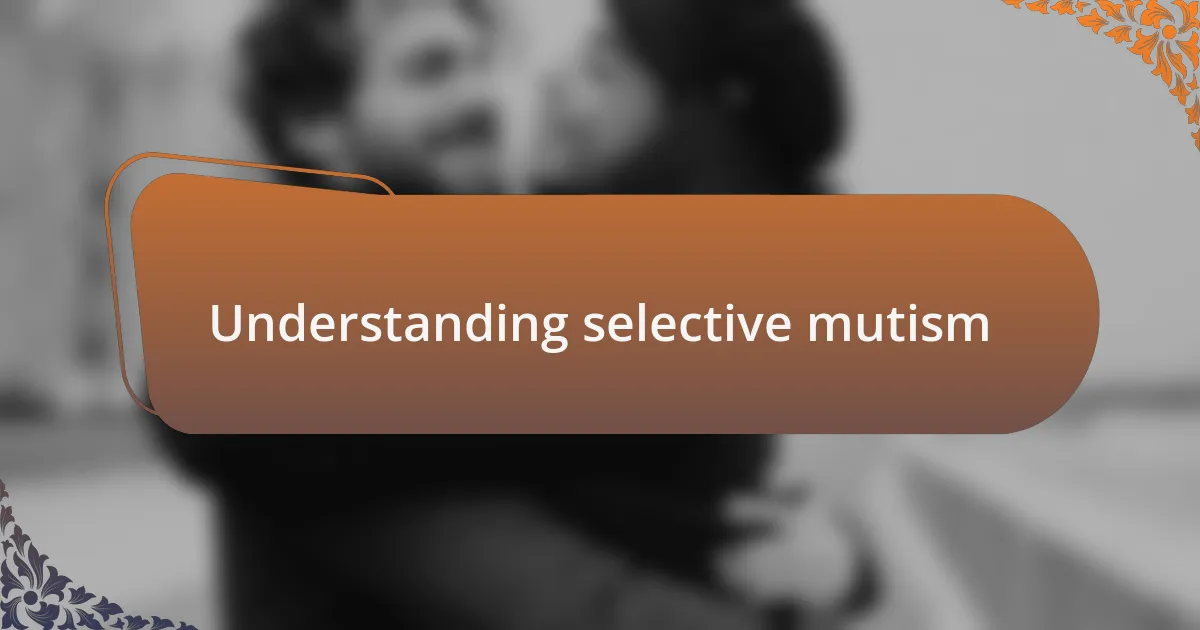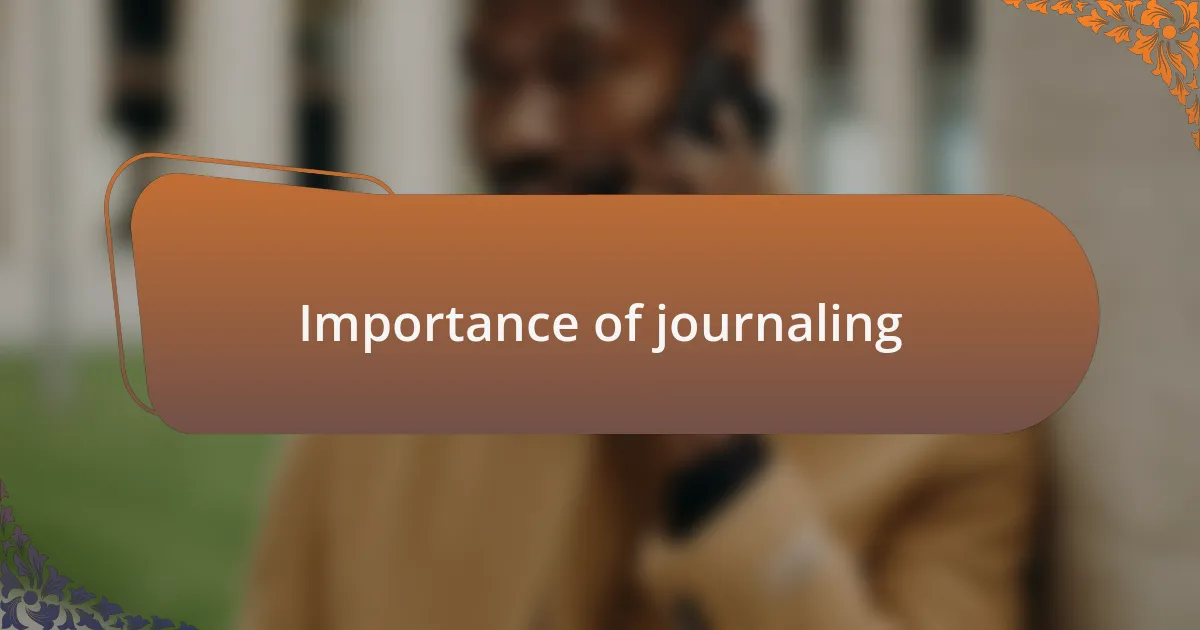Key takeaways:
- Selective mutism is a profound anxiety condition, not just shyness, impacting communication and causing feelings of isolation.
- Journaling serves as a therapeutic outlet, aiding self-discovery, self-compassion, and clearer communication by articulating thoughts and emotions.
- Creating a comfortable journaling environment, setting a regular time, and using prompts can greatly enhance the effectiveness of the journaling practice.
- Sharing journal insights with trusted friends can foster deeper connections and provide validation, encouraging further exploration of emotions and experiences.

Understanding selective mutism
Selective mutism is often misunderstood as mere shyness, but it’s much more profound. I remember a time when I sat in a classroom, feeling the weight of silence suffocating me, even though my thoughts were racing. How can a person feel trapped by their own voice in spaces that should feel safe?
In my experience, selective mutism isn’t a choice – it’s an overwhelming anxiety that prevents individuals from speaking in certain situations. There were moments when I desperately wanted to contribute but felt a knot in my throat. Have you ever felt like your thoughts are screaming to be heard, while your mouth just won’t cooperate?
Understanding selective mutism means recognizing the internal battles people face. It’s not just about speaking; it’s about the emotional toll of isolation and the courage it takes to navigate interactions. I often found solace in writing, as it became my voice when speaking felt impossible. Isn’t it fascinating how our experiences can shape our understanding of connection and communication?

Importance of journaling
Journaling holds immense significance, especially for those navigating the complexities of selective mutism. I’ve often found that when words fail me in conversation, I can pour my heart out onto the page. Isn’t it remarkable how writing can liberate thoughts that feel confined? It becomes a safe space to articulate feelings without the pressure of performance.
Through journaling, I’ve discovered patterns in my anxiety that I might have otherwise overlooked. For instance, certain triggers, like group settings or unfamiliar faces, would inhibit my voice, but writing about these experiences helped me identify specific elements that caused distress. Have you ever noticed how reflecting on past situations can provide clarity and even a sense of control?
Moreover, journaling fosters self-compassion. By chronicling my experiences, I’ve learned to recognize and validate my emotions instead of dismissing them as flaws. Each entry became a testament to my journey, and I began to appreciate small victories, like expressing a thought in writing, as steps toward greater confidence. How powerful is it to give ourselves permission to celebrate progress, no matter how small?

Benefits of journaling experiences
Journaling can be an incredibly therapeutic outlet, especially during challenging times. I remember a period when I felt particularly trapped by my silence. Writing became my lifeline, allowing me to express thoughts I struggled to voice aloud. Doesn’t it feel freeing to see your inner world laid out on paper, even if it’s messy and raw?
Moreover, I’ve noticed how journaling often leads to self-discovery. Reflecting on my daily experiences helped me realize that my fears weren’t as insurmountable as they seemed. One moment, I vividly recalled feeling anxious before a social event, and through writing, I decoded that feeling—was it really the crowd, or was it my fear of judgment? This process of unraveling thoughts helped me gain insights into my emotional landscape, promoting understanding rather than fear.
Finally, maintaining a journaling practice fosters a sense of continuity and growth. When I look back at older entries, it amazes me how far I’ve come. There’s a unique empowerment in acknowledging my growth over time. Have you ever considered how documentation of your journey can illuminate paths you might want to explore further? It’s a beautiful reminder that progress, however small, is still progress.

How journaling aids communication
I’ve found that journaling serves as a bridge to clearer communication. When I sit down to write, I often discover layers of my emotions that I didn’t even realize were there. Have you ever experienced that moment when the right words finally surface? For me, those moments are priceless, turning jumbled thoughts into coherent feelings.
There are times when I can’t find the words to speak, but my pen can articulate what my voice cannot. I remember once trying to explain my struggles with selective mutism to a friend. It felt daunting until I penned my thoughts first. Suddenly, I knew how to convey my experiences more clearly. Writing allows me to refine my message before expressing it aloud, which can be immensely helpful.
Over time, journaling has helped me rehearse dialogues I might find intimidating in real life. I often practice potential conversations on paper, and honestly, it feels comforting. It’s like role-playing with my own mind, which prepares me to face those interactions with a bit more confidence. Isn’t it interesting how the act of writing can transform mere thoughts into a powerful tool for communication?

Personal reflections on my journey
Reflecting on my journey, I’ve learned that my journal has become a safe haven for my thoughts and feelings. Early on, I struggled deeply with sharing my experiences outside those pages. There was one moment, after writing about a particularly challenging day, when I realized how much clarity I gained—clarity that often eluded me in conversation. Have you ever felt that rush of understanding wash over you when you finally articulate something troubling? It’s a powerful experience.
Sometimes, I revisit old entries and can’t help but feel a mix of nostalgia and growth. One entry stood out; it was filled with raw emotions that poured out in the form of frustration and fear about social situations. In reading it again, I felt proud of how far I’ve come. It’s like holding a mirror up to my past, reminding me that while the journey hasn’t been easy, every step has led me towards greater self-acceptance.
In recognizing my progress, I often find myself refining my outlook on those earlier struggles. Each journal entry serves as a testament to not just the challenges, but also the resilience within me. How remarkable is it to see your own evolution reflected on paper? I believe journaling has transformed not only how I express myself but also how I perceive my experiences, capturing a journey that is undeniably mine.

Tips for effective journaling
When diving into journaling, I can’t stress enough the importance of creating a dedicated space where you feel comfortable. For me, finding a quiet corner with soft lighting made all the difference. Have you ever noticed how the environment shapes your thoughts? It’s amazing how the right setting can coax out deeper insights, encouraging honest writing without distraction.
Another tip that has worked wonders for me is to set a regular time for journaling. Initially, I aimed for every evening, but I found I was too exhausted to pour out my thoughts. Instead, I switched to early mornings, and that change was revolutionary. Do you ever find that you have more clarity when you wake up? Those early hours became my sacred time, allowing me to reflect on my dreams or the day ahead in an unhurried manner.
Lastly, I believe in the power of prompts to get the words flowing. There were times when I sat staring at the blank page, feeling disconnected from my thoughts. I remember one night, I wrote, “What did I learn from today?” and suddenly, memories flooded back, weaving together insights I hadn’t acknowledged throughout the day. Isn’t it intriguing how a simple question can unlock so much? Using prompts not only fuels creativity but also helps in exploring layers of feelings that might be difficult to access in the hustle of life.

Sharing my journal insights
When I reflect on my journaling journey, I recall the days when my entries were filled with fragmented thoughts. It was during one particularly challenging week that I stumbled upon a new insight: focusing on one specific emotion each day not only streamlined my writing but also deepened my self-awareness. Have you ever tried narrowing down your feelings? That practice transformed my journal entries from scattered musings to rich narratives full of depth.
I also discovered that sharing snippets of my journal with a trusted friend provided an unexpected layer of understanding. One evening, while reading a particularly vulnerable passage, I felt a wave of relief as I opened up about my struggles with selective mutism. It was astonishing how vulnerability could forge a stronger connection, prompting thoughtful conversations I never anticipated. Has sharing ever helped you articulate feelings you normally kept inside? This profound exchange not only validated my experiences but also inspired me to dig deeper in my writing.
Sometimes, reflecting on past entries allows me to observe patterns I might have otherwise missed. I remember reading a journal from last year where I wrote about a particularly stressful social event, analyzing every detail. It was eye-opening to see how far I had come since then, reinforcing my growth and resilience. Do you ever find that looking back provides clarity? Re-reading those insights fuels my motivation to keep journaling, reminding me that each word contributes to my growth in navigating selective mutism.